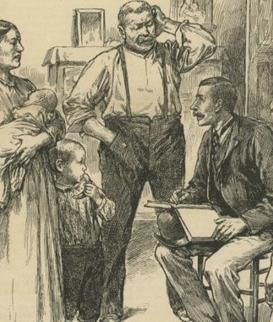Affiliation
This Research Group is part of

Counting Day for the American Census, New York City. By C. Broughton, engraved by H.W. Peckwell. In: Tenement Life. Frank Leslie's Illustrated Newspaper, June 14, 1890. Courtesy Collection Maggie Land Blanck, http://www.maggieblanck.com/Goehle/Germans.html
Principal Investigator, MPIWG
Professor for Media Practices, Humboldt University Berlin
T +49 30 22667 148
The nineteenth century witnessed a new, innovative reflexivity toward cumulative, quantifying statistical methods across science, commerce, and the state. This incremental trust in numbers rested on a trust in data: that a carefully tailored selection of particulars of natural or social phenomena would bring heterogeneous information into commensurable and thus countable form. Seeing and analyzing the world as “data” went hand in hand with the explicit usage of the term and was closely linked to a shift in practices of data collection and statistical epistemologies, laying the foundation for data-driven modes of knowledge production that dominate our current era.
This research group explores the concepts, procedures, and tools that were employed to turn things, people, and minds into quantifiable data points, long before the era of digitization. The group combines a focus on data epistemologies with thick descriptions of data in the making across the humanities and the human sciences, as well as bureaucratic and domestic contexts. In so doing, the projects build on media and gender studies, environmental and supply chain studies, the history of bureaucracy, the history of the humanities, the social, human, and cognitive sciences, and citizen science. Each study centers on various epistemic media—such as paper forms, children’s toys, or film—to analyze the socio-technical and material conditions and cultures of manual data practices. In order to unpack data’s social, economic, and political implications, we examine the making, testing, and use of the tools for data inscription, compilation, and dissemination to show how they in turn shaped research questions and methods, practices of examination, workflows and labor hierarchies, and the relationship between observers and the observed, in different research settings, at home, and in society at large.